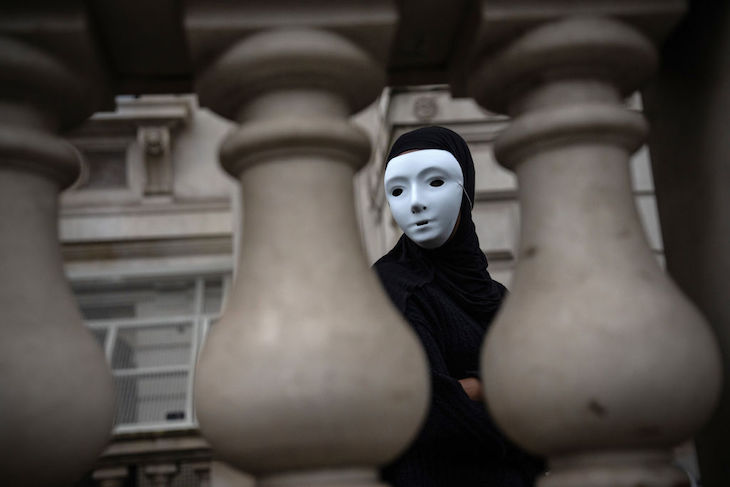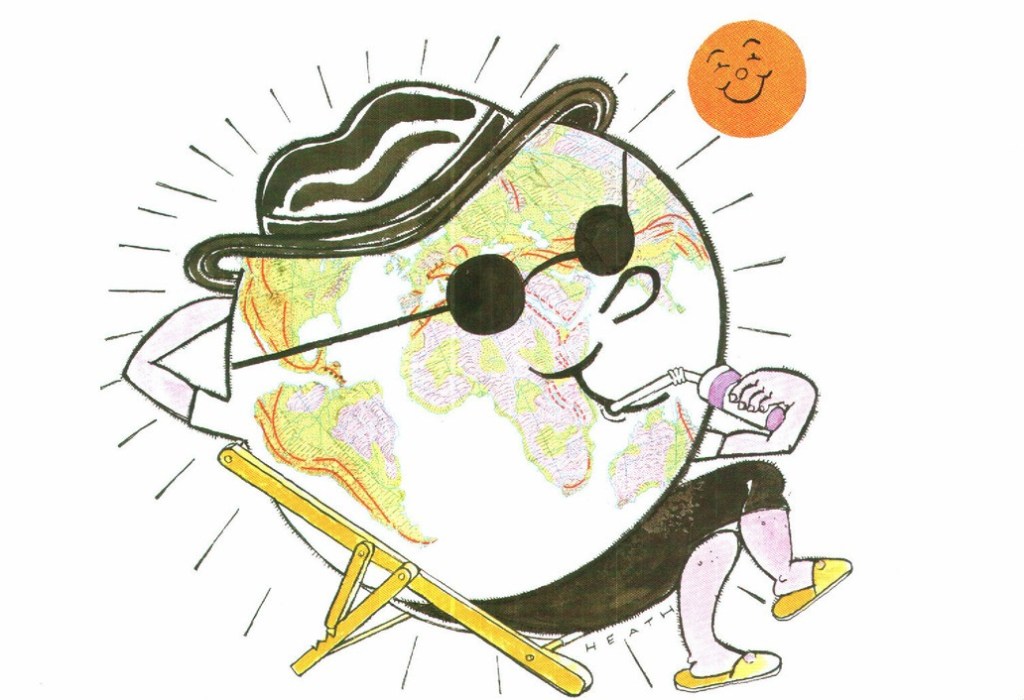We in Britain have become used to the hallmarks of anti-Israeli protests. There are the slogans decrying ‘genocide’. There are chants in sympathy of terrorist organisations. There’s the explicit or insinuated anti-semitism. But one sinister feature making its transition across the Atlantic is the appearance of the face mask.
Wearing a mask at a demo is the perfect expression of radical chic
Footage widely circulated online this week showed an Israeli supporter in New York being attacked by a pro-Palestine activist, who proceeded to stamp and spit on the Israeli flag while shouting profanities. Nothing new here, you might say. It’s all part of the vitriol we expect these days, even on the first anniversary of that terrible massacre in Israel. Video footage of pro-Palestinian campaigners shoving phones in the face of another Israeli supporter in New York and shouting abuse at him are also unlikely to surprise many. Sadly, these scenes from the United States are routinely repeated throughout the West.
What is disquieting in its apparent novelty, however, is that many of these assailants had their faces covered. Troublingly, the spectacle in New York of masked agitators threatening or performing violent acts, has been repeated across North America.
The trend among far-left radicals for sporting face masks is well-established in the US, the disguise being a must-have accessory for Antifa campaigners with a penchant for creating mayhem. So it’s only logical that face covering is becoming common in anti-Israeli protests that are growing in similar vehemence and fury. Logical, too, that they are starting to crop up over here.
In anti-Western protests this year, masks have started to be seen in Britain. Jewish News reporter Lee Harpin saw several on display at a demonstration in London’s Russell Square last Saturday. They may not yet be as common as they are stateside, but knowing our proclivity to import the worst aspects of US radical politics, it would only seem a matter of time before they are.
Wearing a face mask in public became normalised, of course, during the pandemic and lockdown years of 2020-21, years that also saw the swell of radical agitation and Black Lives Matter protests. The two phenomena taken together, it no longer became deemed strange to go on large demonstrations, chant divisive and inflammatory slogans, all the while having one’s face covered. A dangerous bar had been lowered.
For anti-Israeli activists and anti-Western poseurs, it’s also convenient that today’s radical chic accessory, the keffiyeh, can be employed to conceal one’s face and therefore one’s identity. Among demonstrators, there’s not just the logistical imperative behind hiding one’s face, the fear of facing prosecution from the law, of landing oneself in trouble at work should one’s behaviour be caught on camera, or even having your parents catch you in the act. There is the aura of danger, the frisson of excitement, that comes with donning a face mask.
It is the perfect expression of radical chic, performative politics as fashion. If in the form of banners proclaiming ‘I Love Hezbollah’ – as seen again in London the other day – we have the articulation of terrorist chic, then in the face mask we have the embodiment of bandit chic.
The fashion for posturing against the West as an extended form of teenage rebellion is nothing new. Jane Fonda did so famously during the Vietnam War; and it was Tom Wolfe who, in turn, coined the phrase ‘radical chic’ in 1970. Dressing up in foreign garb, embracing the exotic ‘other’, is also a long-established weakness of indulged Westerners who seek to turn their back on their own culture (how ironic that many pro-Palestinian sympathisers are now indulging in their own brand of ‘Orientalism’).
Most of today’s belligerent anti-Western agitators are young. And while youthful politics have forever been prone to performative, radical chic, now they are reaching their apex in an era of shallow, shouty online self-regard.
Online discourse, which determines so much of the nature of politics in the real world, is given to exaggeration and hyperbole. This is the nature of a medium in which each participant clamours for ever-more hits and ‘likes’, and does so through upping the ante, by making increasingly outrageous and outlandish claims. This is why youthful politics today is both so vociferous and vacuous. It’s about posing and seeking attention. It’s what happens when the political is reduced to the personal.
The face mask as a political accessory is a threat to law and order. Those who wear it want to be seen as dangerous, radical and interesting. They are none of those things. Protest mask chic on the streets of London is one US import we could all do without.







Comments